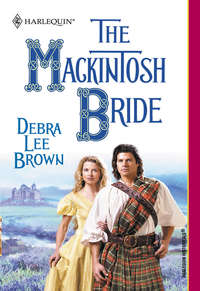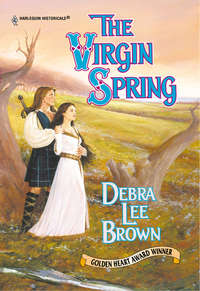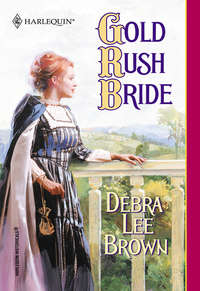
Полная версия
Ice Maiden

“You and I shall marry.”
The Scot’s eyes popped wide. “Yer daft, woman.” He’d be on his way now, thank ye very much. “Besides, I have a bride.” George rose shakily to his feet. Rika rose with him. Sweet Jesus, the woman was nearly as tall as he. “Arranged,” he croaked, “by William the Lyon—my king.”
She flinched at his words. “It matters not.”
Oh, but it did. Women should be small and delicate. Submissive. Her brash demeanor repelled him…yet his body felt strangely stirred.
“Once we are divorced, you can go home and claim her. The dowry is all I want. It’s mine by right, and I will have it.”
What she proposed was unthinkable. Marriage was a sacrament. ’Twas not a pagan ritual to be done and undone on a whim, simply to gain the bride her coin.
“I willna do it.”
“Then I hope you enjoy our island, Scotsman, for you’ll be here a very long time.” She turned her back on him and marched away.
Dear Reader,
Harlequin Historicals is putting on a fresh face! We hope you enjoyed our special inside front cover art from recent months. We plan to bring this “extra” to you every month! You may also have noticed our new look—a maroon stripe that runs along the right side of the front cover and an “HH” logo in the upper right corner. Hopefully, this will help you find our books more easily in the crowded marketplace. And thanks again to those of you who participated in our reader survey. Your feedback enables us to bring you more of the stories and authors that you like!
We have four incredible books for you this month. The talented Shari Anton returns with a new medieval novel. Knave of Hearts is a secret-child story about a knight who, in the midst of seeking the hand of a wealthy widow, is unexpectedly reunited with his first—and not forgotten—love. Cheryl St. John’s new Western, Sweet Annie, is full of her signature-style emotion and tenderness. Here, a hardworking horseman falls in love with a crippled young woman whose family refuses to see her as the capable beauty she is.
Ice Maiden, by award-winning author Debra Lee Brown, will grab you and not let go. When a Scottish clan laird washes ashore on a remote island, the price of his passage home is temporary marriage to a Viking hellion whose icy facade belies a burning passion…. And don’t miss The Ranger’s Bride, a terrific tale by Laurie Grant. Wounded on the trail of an infamous gang, a Texas Ranger with a past seeks solace in the arms of a beautiful “widow,” who has her own secrets to reveal….
Enjoy! And come back again next month for four more choices of the best in historical romance.
Sincerely,
Tracy Farrell, Senior Editor
ICE MAIDEN
DEBRA LEE BROWN

TORONTO • NEW YORK • LONDON
AMSTERDAM • PARIS • SYDNEY • HAMBURG
STOCKHOLM • ATHENS • TOKYO • MILAN • MADRID
PRAGUE • WARSAW • BUDAPEST • AUCKLAND
Available from Harlequin Historicals and DEBRA LEE BROWN
The Virgin Spring #506
Ice Maiden #549
For James with love
Contents
Chapter One
Chapter Two
Chapter Three
Chapter Four
Chapter Five
Chapter Six
Chapter Seven
Chapter Eight
Chapter Nine
Chapter Ten
Chapter Eleven
Chapter Twelve
Chapter Thirteen
Chapter Fourteen
Chapter Fifteen
Chapter Sixteen
Chapter Seventeen
Chapter Eighteen
Chapter One
The Shetland Islands, 1206
He was dreaming.
Aye, that explained everything.
Grit and salt stung his eyes. Icy water rushed over his body in a bone-chilling wave. He couldn’t feel his legs anymore. If only he could move or cry out.
“He is perfect,” a feminine voice whispered close to his ear. A soft fingertip grazed his jawline.
“Perfectly dead, I’ll wager.” The rough voice was a man’s, the accent fair strange.
He cracked an eye to the flat, white light of dawn and tried to focus.
“You wager poorly, Lawmaker. Look, he wakes.”
Nay, he wasn’t dreaming at all.
He was dead.
The vision floating above him was enough to convince him. He’d heard of them, of course, in legends told around campfires late at night by seafaring Danes and Norwegians come to trade in Inverness. But he was a Christian and believed not in such tales.
Yet there she was, looming over him, waiting.
“Valkyrie,” he breathed.
The vision frowned, narrowing ice-blue eyes at him.
“You’re right,” the male voice said somewhere at the edge of his consciousness. “He’s not dead, just daft.”
Oh, he was dead, all right. How else could he explain such a creature?
Two thick, flaxen braids secured with rings of hammered bronze grazed his bare chest as she studied him. She wore a helm, as might a warrior, embossed with strange runes—the kind he’d seen on ancient standing stones near the Bay of Firth—and a light hauberk of finely crafted mail.
But she was a woman, of that there was no doubt. The blush of her cheek, the ripeness of her lips, belied her garments and her hard, calculating expression.
His gaze drifted lazily along the curve of her neck and the narrow set of her shoulders. Her arms were bare and sun bronzed, adorned with more of the same hammered metal. With each measured breath, her breasts strained ever so slightly against her hauberk.
“Am I—” he rasped. “Is this—” He coughed up another lungfull of seawater, then met the Valkyrie’s penetrating gaze. “Valhalla?”
Men’s laughter shattered the eerie harmony of cawing terns and cormorants.
“Likely the farthest place from it,” the Valkyrie said. “This is Frideray. Fair Isle.”
His head spun and a wave of nausea gripped him. “But then…” He tried to sit up. She pushed him firmly back down onto the sand. Another icy surge washed over his numb legs and he started to shiver. “Wh-who are ye?”
“I am Ulrika, daughter of Fritha.”
“Rika,” he breathed, fighting to stay conscious.
At her command, a half-dozen hands clutched him and hefted him from the beach. Pain shot through his limbs, and he bit back a groan.
“Thor’s blood, he’s heavy,” the man she’d called Lawmaker said. “We need another man.”
Instantly another set of hands supported his limp, sea-battered body. Her hands. They were small, softer than the others. His head lolled to the side and found her crystal gaze.
“My ship,” he mouthed, unable to make the sounds.
“Lost,” she said, “and every man with it.”
A searing pain twisted his gut, and he squeezed his eyes shut. “Nay, it canna be. My…my brother?”
“All.”
The backs of his eyelids blazed with horrific visions of the shipwreck. The storm had come upon them in the night without warning. Biting sleet and lightning, gale-force winds the like of which he’d ne’er known in the Highlands. The howling haunted him still—a high-pitched railing, the shriek of the devil himself. The hull of their ship had shattered like a child’s toy against rocks that had no reason to be there. At least not from the charts they’d carried.
His brother. His men.
All dead.
“May God have mercy on their souls,” he whispered.
The woman snorted and tightened her grip on him. His eyes fixed on the hard set of her jaw as they bore him up a steep hill. She neither faltered nor slowed her pace, ignoring the labored grunts and winded breaths of her male companions.
He was vaguely aware of the landscape around him. Rocky and barren, with a chill deadness about it that was reflected in the woman’s eyes. She didn’t look at him, not once, until the thatched roofline of a long, low house came into view.
They stopped outside the stone structure. He sucked in a breath as his bearers dropped him unceremoniously onto a bench in the courtyard.
“You’re a Scot,” the woman said, and eyed him speculatively.
He nodded, trying to focus on her face. “Grant. George…Grant.” His head throbbed as the white winter sky spun above him like a dervish.
“Grant,” she said. “An odd name.”
“I…I am…The Grant.”
“A chieftain?” Lawmaker said. “Well, then, Ulrika, he is a good choice after all.”
The woman slid a wicked-looking dagger from the scabbard at her waist. He tensed as she cut away his sopping plaid. God knows what had happened to his weapons. Likely lost at the bottom of the sea.
He was too weak to struggle, or even protest. In a matter of seconds he lay naked before her, shivering uncontrollably. Her gaze roved over him coldly, eyeing a sheep for the slaughter. Aye, well, if he wasn’t already dead, he would be shortly. He mouthed a silent prayer.
“He’ll do,” Rika said, and sheathed her weapon. To his astonishment she covered him with a thick woolen blanket.
“Do for what?” A vision of pagan sacrifice flashed in his mind’s eye.
Lawmaker stood over him and arched a peppered brow. “For her husband.”
“H-husband?” His stomach did a slow roll, his head throbbed in time to the dull aching in his bones.
“Sleep now, and regain your strength,” Rika said.
“We’ve much to prepare before the wedding.”
He watched her as she turned and walked away, the short hauberk clinking with the gentle sway of her hips.
Her companions lifted him from the bench.
“Wh-what’s happening?” he breathed, and met Lawmaker’s stoic gaze.
“Something I never thought to see.” The older man smiled cryptically, then followed the woman warrior, Ulrika, daughter of Fritha, into the haze of the longhouse.
“Vikings,” he mouthed.
A band of bloody Vikings.
Rika sucked down the draught of mead and cast her drinking horn aside. “So, old friend, what think you of my plan?”
Lawmaker toyed with the end of his beard and looked at her for what seemed an eternity before answering. “You’re sure you wish to do this?”
“It’s the only way. You know that as well as I. The dowry my marriage brings with it will buy Gunnar’s release.”
“So it would. But we know not where your brother is held.”
“Dunnet Head,” Rika said. “On the mainland. I heard Brodir’s men speak of it.”
“You are certain?”
“Ja.”
Lawmaker nodded. “Brodir will not be pleased. He expects to come home to a bride—and a dowry that will buy him fine goods and timber for ships.”
Rika looked away and swallowed hard. She did not wish to think of Brodir. Not now, not ever. True, they were betrothed in the Christian way—her father had arranged it when she was a child—but Brodir had gone a-Viking months ago, and she prayed each day that some evil would befall him and he’d not return. Absently she twisted the bronze bracelets circling her wrists, and mustered her resolve.
“Brodir will return to a penniless divorcée who will no longer be of interest to him.” So she hoped.
“And her brother restored to his rightful place as jarl,” Lawmaker said, finishing the thought for her.
“Exactly. It will work. It must.” Her brother, Gunnar, meant the world to her. He was the only family she had left. Her estranged father didn’t count, of course. All she wanted from him was the dowry.
She’d do anything to free Gunnar. Anything.
Lawmaker eyed her again, silently, while she fidgeted on the bench, impatient. She must have the elder’s blessing and his help. The henchmen Brodir had left behind to watch her were dangerous men. Without Lawmaker’s consent, her plan was doomed.
Finally he said, “It will be dangerous—and complicated.”
Rika flew off the bench in elation, ignoring the warning in Lawmaker’s implied consent. “I’m prepared for danger. As for complications, I leave those to you.”
“Ja, well…” Lawmaker’s gaze drifted to the bed box at the end of the longhouse where the Scot had thrashed all day in a fitful sleep. “He might have something to say about it.”
Rika smirked, triumphant. The Scot had little choice but to comply. “He’ll do as I bid him.”
“He is a chieftain, a laird. Think you he’ll agree to wed you just like that?”
“Chieftain, indeed.” She made a derisory sound.
“He’s a weakling. Look at him.” Her gaze washed over George Grant’s unremarkable features. “Why, he doesn’t even have a beard.”
Lawmaker cast her one of his ever-patient smiles—the kind he reserved for children, and for her. “Don’t underestimate the man. A beard is not the quintessential mark of virility among all peoples, Rika—only ours. You’ve much to learn about the mainland and its folk, should you think to venture there.”
“Perhaps,” she said absently, and continued to study the Scot. He was more formidable than she’d first thought. Broad of shoulder and well muscled, though she hadn’t seen him on his feet yet, so it was hard to judge his height. Surely he wasn’t taller than she. Few men were.
Her gaze fixed on his long, tousled hair. Rich and tawny, it spilled across the pillow like a river of honeyed mead. Thin braids, like a woman’s, graced each temple. Never had she seen a man plait his hair so.
She smiled inwardly. Ja, this chieftain would be easy to control.
George woke with a start, fumbling for weapons that weren’t there. “What the devil—?” All at once he remembered—the voyage, the shipwreck, the Viking woman.
He blinked the sleep from his eyes as a barrage of peculiar sounds and smells assailed his senses. He lay in a strange sort of bed at one end of the longhouse. ’Twas more of a box, really, elevated off the hardened dirt floor.
In the center of the room a fire blazed, curls of smoke drifting lazily upward and out a hole in the roof. Strangely clad folk—men and women and children—gathered around a long table for what looked to be the evening meal.
His gut tightened as he recalled the last meal he’d eaten. A bit of bread and cheese shared with Sommerled, his younger brother.
Dead.
All of them dead.
Grief gnawed a hollow inside him. He pushed through it and, moving carefully, swiveled naked from the bed box, pulling the soft blanket with him. The sea had had her way with him. Every muscle cried out, and he grimaced against the pain.
Before his feet touched the ground, she was there. Rika, daughter of Fritha.
He stared at her, tongue-tied. She looked different without her warrior’s garb. Her hair shone white-gold in the firelight, falling loose about her shoulders. She was dressed simply in a gown of pale wool, girded with the same finely tooled belt she’d worn that morning. Her hand twitched on the hilt of her sheathed dagger.
“You must eat,” she said. “I’ll have something brought to you.”
“Nay, I willna lay here like a—” He grunted as he tried to rise. She instantly placed a hand on his shoulder to stop him. ’Twas warm, surprisingly so, given the coldness of her eyes.
“Lay back,” she ordered, and pushed him down onto the soft pillows. “You’re hurt and must rest.”
She spoke matter-of-factly, with not a hint of compassion. Could he not see with his own eyes that she was a woman, he would not have believed it, so cool and authoritative was her demeanor.
He obeyed, and slid back into the bed box.
She called for a woman to bring food, then settled next to him on a bench, her back arrow-straight, her expression unreadable.
“You are Grant,” she said.
He nodded. “Aye, George of Clan Grant—of Scotland.”
“George?” She wrinkled her nose. “Not a manly name at all.”
Her impertinence stunned him. “’Tis a proper Christian name. But I expect ye wouldna know of such—”
“I shall call you Grant.” She turned to accept a trencher of food from a woman who bore a babe straddled across her hip.
’Twas then he noticed the scar. An angry, razor-sharp line running from her left ear under her chin. He’d not noticed it that morning on the beach. Someone had cut her throat—or had tried.
The tiny bairn squealed, his hands flailing madly. Rika reached out—on impulse, it seemed—and captured the infant’s chubby fist in her hand.
A warm, bittersweet smile blossomed against her cool features. The contrast startled him. ’Twas as if she were a different person altogether.
The moment was short-lived.
Rika caught him staring at her, and the smile vanished from her lips. She scowled at the babe and waved the woman off. “Take it away.”
Hmph. As he’d suspected, she had not a compassionate bone in her body. And yet…
“Here, eat.” Rika thrust the trencher toward him.
The woman shot him a cautionary glance, then hurried back to table. No one else seemed to pay them any mind—save Lawmaker, who watched his every move, and a sandy-haired youth whose twisted scowl and dark eyes were reserved entirely for George.
Nodding at them, George grasped the trencher and accidentally brushed her fingers. A shiver shot through him. She, too, felt something. He watched her eyes widen as she snatched her hand away.
He had no appetite, but forced himself to eat some of the food. ’Twas fish mostly, both salted and pickled, and a gruel of what smelled suspiciously like turnips. He picked at the meal while she studied him.
As his head cleared and his strength returned, he took stock of his situation. ’Twas not the best of circumstances he found himself in. Shipwrecked and alone, without a weapon to his name.
His hosts, if one could call them that, were folk the likes of which he’d ne’er seen. They spoke his tongue, but mixed it with strange words. Norse words. Though they were not like any Norsemen he knew. They were grittier, more primitive—as if time had passed them by.
He counted at least a dozen men in the smoky room, and half again that many women. Somehow, he knew this wasn’t all of them. This was but one house, and he seemed to recall others when they carried him up from the beach.
Fair Isle.
George knew not where it was. Only that he’d been bound for Wick from Inverness, and a winter gale had blown them off course, far to the north. Past the Orkneys, if he had to venture a guess. How would he ever get back?
“You wish to go home,” Rika said, reading his mind.
He dropped the bit of fish back into his trencher and met her gaze. “That I do.”
“You shall, as soon as you’re fit.”
“Ye have a ship then! Thank Christ.” His spirits soared. They would leave immediately, of course. “Who shall take me? Whoever it is shall be well paid for his trouble.”
“I shall take you, as soon as our business together is finished.”
“What business?” His brows collided in a frown. Something in her voice, and the way she seemed to look right through him, caused gooseflesh to rise on his skin.
“Simply this,” she said. “You wish to return home, and I can arrange that. But first, there is something you must do for me.”
George set the trencher aside and sat up in the bed. “What, pray tell?” He wasn’t used to dealing with women, and this one had rubbed him the wrong way from the start.
For a long moment she didn’t answer, just sat there staring at him. He could almost see her mind working. Once, she opened her mouth to speak, then thought better of it.
His gaze lingered on her lips. They were lush, ripe, as they’d been on the beach that morning when she hovered over him, her breath hot on his face. He felt an unwelcome tightening in his loins and grasped the edges of the wool blanket that covered him.
Finally she spoke. “You and I shall marry.”
“What?” His eyes popped wide. He thought he’d dreamed that bit of conversation she and Lawmaker had had on the beach. God’s truth, it had seemed more nightmare than dream. “Say again?”
“You heard me. We shall marry.” Her eyes were inscrutable, yet her lower lip trembled, belying her confidence. “I need a husband to claim my dowry. Once I have it, you may go home.”
“Ye’re daft, woman.” He’d be on his way now, thank you very much. He glanced around the bed box for his plaid, but saw neither it, nor any kind of garment. Wrapping the blanket around his waist, he again tried to rise. This time, when Rika tried to stop him, he slapped her hand away.
“I have a bride,” he said, and rose shakily to his feet. “’Tis all a—” Rika rose with him. Sweet Jesus, the woman was nearly as tall as he. “Arranged,” he croaked. “By William the Lion, my king.”
Her eyes widened as she stared up at him, as if he’d said or done something unexpected. She eyed him up and down, then frowned. “You’re tall, Scotsman.”
“As are ye.” He raked his eyes over her body with a lack of tact that matched her own audacity. “Not like a woman at all.”
She flinched at his words. “It matters not.”
Oh, but it did. Women should be small and delicate. Submissive. A proper Christian woman wouldn’t dream of talking to a strange man. Her brash demeanor repelled him, yet his body felt strangely stirred.
“About your bride, I mean. Once we are divorced you may go home and claim her. The dowry is all I want. It’s mine by right, by law, and I will have it.”
He shook his head, not understanding her at all. What kind of scheme was this? “There can be no divorce. Ye are mistaken. A man weds for life.” He tried to move past her, but she stepped into his path.
The sandy-haired youth at table shot to his feet, eyes blazing. George had guessed the lad would be trouble. No matter. George was about to snatch the dirk from Rika’s belt when Lawmaker reached up and yanked the youth back down to the bench.
“Not always for life,” Rika said, ignoring the lad’s move. “Ask Lawmaker. He’ll tell you. Divorce is not common, but does occur among my people and suits my purpose well.”
The woman was clearly touched. “And what purpose is that?”
“I told you. I want my dowry—nothing more. Once we are wed, you shall acquire it for me from my father. When the silver is in my hands we’ll declare our divorce before the elders.” She shrugged. “After that, I care not what you do. Our ship will take you anywhere you wish.”
George opened and closed his mouth. Twice. He shook his head again, as if he didn’t understand her, but every word was clear despite her strange accent.
“Just like that,” he said.
“Ja, just like that.”
What she proposed was unthinkable. Outrageous. ’Twas a blasphemy against God. Did she think to use him to gain her fortune, let her think again.
Marriage was a sacrament and, at its best, an arrangement designed to secure an alliance between clans. ’Twas not a pagan ritual to be done and undone on a whim, simply to gain the bride her coin.
“I willna do it,” he said.
“Fine.” She stretched her lips into a thin, tight line. “I hope you enjoy our island, Scotsman, for you’ll be here a very long time.” She turned her back on him and marched toward the table, where all eyes were now trained on him.
“A lifetime, perhaps,” she called over her shoulder, and didn’t miss a step.
Chapter Two
The Scot was stubborn beyond belief.
For days Rika and her people watched, amused, as Grant worked in vain to build a seaworthy raft of driftwood and pitch and bits of rotten rope.
She stood on the cliff overlooking the beach, her cloak pulled tight about her, and observed him. The wind whipped at his hair and the loose-fitting tunic one of the men had given him to wear. His legs were bare though booted, and she knew not how he could stand for so long in the icy water, his gaze fixed on the southern horizon.







